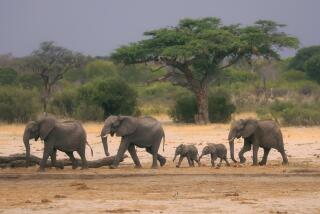Chance of Stability in Southern Africa Helps Dream of Cross-Continent Game Park
- Share via
JOHANNESBURG — The warming political climate in southern Africa is pushing a conservationist’s dream closer to reality--creation of the world’s biggest game park, straddling the continent from the Atlantic to the Indian Ocean.
The dream envisions the dismantling of fences marking national boundaries to allow the continent’s varied wildlife the freedom it once enjoyed to migrate across the African wilderness.
South Africa’s plans to scrap apartheid, Mozambique’s moves toward multiparty democracy and Namibia’s independence hint of a climate of cooperation that could free the region’s dwindling game stocks from the constraints of artificial boundaries.
Conservationists, who have worked together for years over hostile borders, hope that politicians can agree to lead southern Africa into a new era.
“There is such a spirit of goodwill among all southern Africans. The public is beginning to think green, we are catching the spirit of the new decade,” said Braam van der Vyver, spokesman for South Africa’s National Parks Board.
But the environmental lobbyists are aware that huge problems exist and admit that it will take years before they attain their ambition of complete international cooperation.
“We know our long-term objectives, but we are still at an early stage. The informal relationship is there, it is a start,” Van der Vyver said.
A civil war rages in the area of Mozambique that adjoins South Africa’s vast Kruger National Park. Poaching, well controlled in South Africa’s parks, is rampant in Mozambique and other neighboring countries.
Namibia has reported an increase in elephant and rhino poaching since South Africa relinquished the territory last March and withdrew thousands of troops from the remote areas that are the natural habitat of the rare desert elephant and black rhinoceros.
A number of informal agreements have already laid the groundwork for a future southern African park. Private South African conservation groups, for example, are sponsoring the training of Mozambican anti-poaching patrols.
“In the light of the favorable political development in southern Africa, we anticipate similar cross-border conservation projects to be negotiated . . . in the near future,” parks board chief director Tol Pienaar said in a statement.
“The concept of conservation areas extending past national borders, so-called ‘peace parks,’ is being strongly propagated. The National Parks Board supports this notion.”
The Kruger Park, which borders Mozambique and Zimbabwe and is close to Swaziland, is central to the concept.
Conservationists predict that once peace prevails in Mozambique, a vast area of wild country along the Lebombo mountains could be added to the park, thus doubling its size to an area about the size of the Netherlands.
They say there is the potential to connect these reserves along the Limpopo and Zambezi river valleys to parks in Botswana and Zimbabwe and then on to the vast tracts of Namibian desert adjoining the Atlantic seaboard.
Swiss-based Jim Thorsell, international park specialist with the World Conservation Union, told the Johannesburg Star newspaper that southern Africa was ripe for many more binational or multinational parks.
Game reserves already straddle borders between South Africa, Botswana, Lesotho, Namibia and Zimbabwe. If the fences came down, large mammals would once again be able to make their age-old continental migrations.
Officials say that international cooperation would give a much-needed boost to southern Africa’s flagging tourist industry, hit by years of political turmoil.
The Kruger Park is South Africa’s biggest tourist attraction and its lodges are always fully booked at peak periods, sometimes turning away three out of four applications for accommodations.
More to Read
Sign up for Essential California
The most important California stories and recommendations in your inbox every morning.
You may occasionally receive promotional content from the Los Angeles Times.













